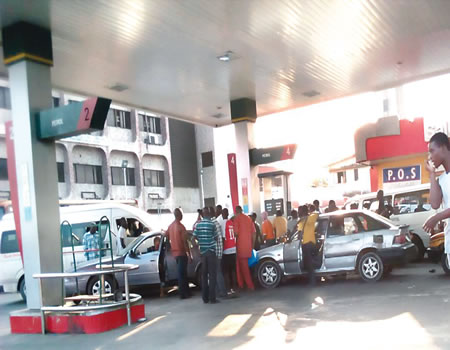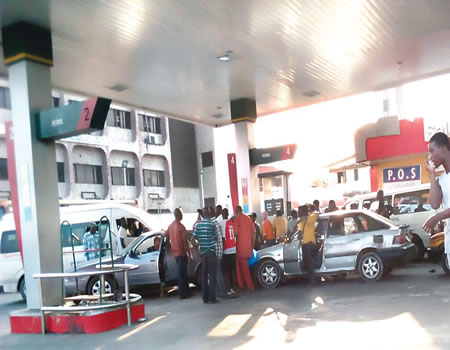LAST week Monday, when images and stories about long queues of vehicles at filling stations emerged on social and conventional media, Nigerians were flabbergasted because it was a situation of taking one step forward and 10 steps backward for the country.
Unfortunately, the queues came about three weeks after the Group Managing Director of Nigerian National Petroleum Corporation (NNPC), Dr. Maikanti Baru, boasted that the era of frequent scarcity of petrol in cities across Nigeria is gone and would never be witnessed in the country again.
Baru, was quoted by a statement from Ndu Ughamadu, the spokesman of the NNPC on November 7, 2017.
Also quoted in the statement was the Chief Operating Officer, (COO), Downstream, and alternate Chairman of the PPMC board, Mr. Ikem Obi, who also stated that the country would never return to the era of products scarcity.
According to the statement, the corporation also assured the public of a hitch-free supply of petroleum products across the country during the coming yuletide season.
“The festive season is fast approaching, a period when people always expect queues to occur. If last year you had a queue-free festive season, we want this year’s to be a season where fuel station attendants will be inviting motorists to their stand for fueling,” Baru said.
With such mandate given to the new PPMC board, many would have thought that such challenge had gone forever.
Causes of the latest fuel crisis (not fuel scarcity)
Several reasons have been attributed to the recent sudden emergence of long queues across major cities in Nigeria. Many blamed independent marketers, others blamed major marketers and private depot owners. Minister of State for Petroleum Resources, Dr Emmanuel Ibe Kachikwu, blamed the queues on shortfall in supply acording to him, “The major problem is the gap in terms of volume, because NNPC is the only one importing the product to the country.”
However, investigation by the Nigerian Tribune revealed that the major reason for the long queues was the inferno at NNPC jetties in Apapa on September 19, 2017, was the main cause of the long queues. Around 3am on Tuesday, 19th September, a vessel, identified as Histri a Ivory, was discharging petrol while some hoodlums were scooping petrol from the vessel which later resulted into an inferno in which four people were reported dead.
The government’s reaction through its agency, NNPC, was to assure motorists that the incident would not affect supply.
According to a statement by the Corporation, “NNPC assures motorists and other consumers of petroleum products nationwide that the fire incident which occurred at Apapa loading jetty at the early hours of today will not affect supply of petroleum products. Already, NNPC has deployed a team of engineers to the jetty while the repair of the affected parts would commence immediately. The fire was sparked from the activities of hoodlums who were scooping fuels spilled from ships discharging fuels at the jetty.
“NNPC Group Managing Director, Dr. Maikanti Baru, who has been fully briefed on the incident, described the occurrence as unfortunate, assuring that NNPC has more than 1.6billion litres of Premium Motor Spirit (PMS), otherwise called petrol, enough to last for 48 days. Dr. Baru also said the Corporation also had in stock, sufficient quantity of Automotive Gas Oil (AGO), also known as diesel, Dual Purpose Kerosene (DPK), otherwise referred to as kerosene, as well as Aviation Turbine Kerosene (ATK) to serve the country.
“NNPC advised motorists not to engage in panic buying, adding that they should report any challenge they may have in the course of purchasing fuel to the Department of Petroleum Resources (DPR) which is statutorily empowered to deal with such issues. DPR has offices located in all parts of the country. Meanwhile, the government is working assiduously to arrive at an amicable resolution of outstanding issues with the industry unions.”
Nigerian Tribune can reliably reveal that the jetty that was burnt is yet to be fixed, the reason the NNPC now relies on private depot owners, Nipco and Aiteo for through-put arrangements where the major marketers can load fuel.
Besides, members of Independent Petroleum Marketers Association of Nigeria (IPMAN) usually get their supplies majorly at Ejigbo, Mosinmi, Ibadan and Ore depots. While Ore depot has been shut for years now, other depots could not get supplies due to the burnt depot and ruptured pipelines. They however rely on allocation from the NNPC through the private depot owners who are supposed to sell to IPMAN members at N133.28 per litre.
According to IPMAN, the private depot owners under the aegis of Depot and Petroleum Products Marketers Association of Nigeria (DAPPMA) were selling to them at N141 per litre, thus making abnormal profit thereby ‘eliminating’ competition among the marketers.
Speaking with the Nigerian Tribune recently on the crisis, the South West Zonal Chairman of IPMAN, Ahmed Debo, accused the NNPC of playing double standards by favouring DAPPMA regarding supply of petrol at the expense of his members.
According to him, “NNPC treats DAPPMA with priority by giving them products while they now resell to our members at above the recommended ex-depot price. The recommended ex-depot price supposed to be N133.30 per litre, but they are selling at N138-N143 per litre.
“If we add other costs to it, we cannot sell at N145 per litre. So until NNPC gives us enough supply and allows us to be independent of the private depot owners, over 900 filling stations may be shut due to lack of products and the hardship may continue for long.”
The Executive Secretary of DAPPMA, Femi Adewole, however said that: “we don’t respond to IPMAN allegations because not all private depot owners are DAPPMA members. Infact, our members are made up of just six companies so that is why we didn’t respond to them.
“All our members were selling at N145 per litre during the recent fuel crisis. We operate with major marketers and as you know, all major marketers were also selling at N145 per litre.”
On what would be the lasting solution so that such ugly scenarios won’t repeat themselves in the future, he simply stated that: “the government and NNPC knew what they did last year to ensure fuel availability during the yuletide. We partnered them and ensured we had abundance last year.”
The Chairman, IPMAN Ejigbo depot branch, Ayo Alanamu Balogun, also stated that “NNPC officials were collaborating with the private depot owners to create artificial scarcity. They gave the products to them, the private depot owners in turn sell to middlemen in bulk who later sell to independent marketers at N143 per litre.
They were hiding behind these marketers to defraud us.
“Meanwhile, they said they gave the products to private depot owners at N117 per litre ex-depot price. We expect them to sell to us at N133.28 per litre but they do not and NNPC is not doing anything about it.
“We raised this issue at a recent seminar where the Group Managing Director of NNPC, Maikanti Baru, was represented.
We implored him to investigate if it was true or whether we were lying. We also presented him with evidences, yet, nothing happened.”
And according to simple economic principles, shortage in supply will lead to hike in prices. When the commodity prices are soaring, producers with the commodity will begin to hoard and rationing will commence to push prices further until it reaches the peak before it commences downfall again maybe due to regulation or commodity availability.
The way forward
According to a marketer who pleaded anonymity, he said for the fact that some people benefit from every Nigerian situation, it may be difficult to proffer a lasting solution to the problem.
According to him, “as you may be aware, of the fact that some people benefit from these situations, it may be difficult to be permanently addresses. This is because, for it to be addressed, fuel subsidy must be removed completely and allow for market forces to dictate the prices at any given time.
“The Federal Government claimed they have liberalised the market, yet they gave us price width to sell. Invariably, they have fixed the price at N145 per litre. What you reporters should have asked is that ‘why would the NNPC, which is a government agency, become the sole importer of petrol? The agency saddled with the responsibility of fuel price regulation (PPPRA) has been sidelined by the NNPC.
“The price modulation regime introduced by Minister of State for petroleum resources, Dr. Ibe Kachikwu, is subjected to quarterly review, but I’m sure you are aware that it has not been reviewed since June 2016 when it was introduced. We can’t be running two different economic models in same country because of a region, the government will continue to subsidise fuel to that region while the other region will be made to pay near market prices.”
He however concluded that absolute deregulation will give lasting solution to perennial fuel scarcity in Nigeria.
Meanwhile, the Director-General, Lagos Chamber of Commerce and Industry (LCCI), Mr. Muda Yusuf, urged the Federal Government to liberalise the downstream sector for unfettered private sector participation and investment.
According to him, “the federal government should liberalise the downstream petroleum sector for unfettered private sector participation and investment, while ensuring that the refineries are operated as commercial business entities. However, for the whole effort to be error-free and meet world best practices, the approach should be subjected to appropriate regulatory framework that defines the role of NNPC, while a model that would allow for a level playing field for all operators including the NNPC should be adopted.
“We have concerns over lack of clarity on the deregulation and liberalisation of the sector. This policy lacuna has put many investments in the sector at risk; while many other investment decisions have been put on hold. The private sector needs to participate wholly.”







